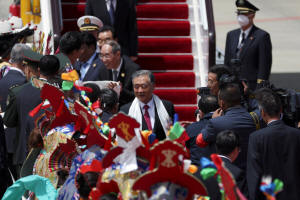China marks Tibet anniversary with call to accept Communist Party rule
 Send a link to a friend
Send a link to a friend
 [August 19, 2021]
By Yew Lun Tian [August 19, 2021]
By Yew Lun Tian
BEIJING (Reuters) - China on Thursday
marked the 70th anniversary of the founding of the Tibet Autonomous
Region on the roof of the world, with a call to accept the rule of the
Communist Party.
Beijing has ruled the remote western region since 1951, after its
People's Liberation Army marched in and took control in what it calls a
"peaceful liberation".
"Tibet can only develop and prosper under the party's leadership and
socialism," Wang Yang, who heads a national organisation responsible for
uniting all races and all parties under the leadership of the Communist
Party, said at the event in the region's capital, Lhasa.
The celebration, attended by almost 10,000 people, was held at the foot
of the iconic Potala Palace, a sacred Buddhist site associated with the
Dalai Lamas.
A nationwide live telecast of the celebration prominently featured a
four-storey high portrait of Chinese President Xi Jinping towering over
the audience.
Propagandists in the 1950s and 1960s used to extensively display Mao
Zedong's portraits at rallies and celebrations to whip up a personality
cult around him and cultivate loyalty.
Most leaders after Mao forbade the practice, although under Xi's rule,
his solo portraits as well as those with him and four previous leaders
have been placed extensively in Tibet.
[to top of second column]
|

Wang Yang, chairman of the Chinese People's Political Consultative
Conference (CPPCC) National Committee, arrives at an airport before
the celebration marking the 70th anniversary of China's control over
Tibet, in Lhasa, Tibet Autonomous Region, China August 18, 2021.
cnsphoto via REUTERS

The party's atheist Han leaders in Beijing have also
made extra efforts to cultivate loyalty among Tibetans, many of whom
are devout Buddhists and traditionally view the Dalai Lamas as their
spiritual leaders.
Beijing brands the current Dalai Lama, exiled in neighbouring India,
as a dangerous separatist and instead recognises the current Panchen
Lama, put in place by the party, as the highest religious figure in
Tibet.
As a mark of the party's rule over Tibetan Buddhism, Wang presented
the Panchen Lama with a commemorative plaque at the ceremony.
(Reporting by Yew Lun Tian; Editing by Anil D'Silva)
[© 2021 Thomson Reuters. All rights
reserved.] Copyright 2021 Reuters. All rights reserved. This material may not be published,
broadcast, rewritten or redistributed.
Thompson Reuters is solely responsible for this content. |